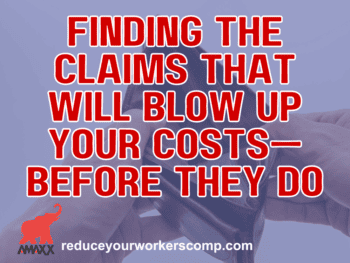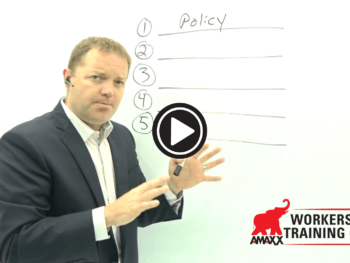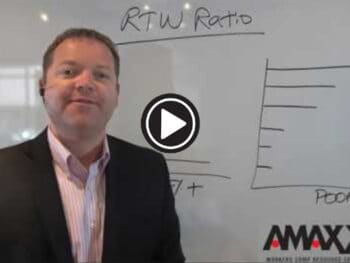
But, accidents will eventually happen. Property damage happens. Workers get injured. Customers get injured. So how can you tell if your carrier or TPA is doing a great job and looking out for your bottom line?
Click Link to Access Free PDF Download
5 Ways to Tell Your TPA Is Looking Out for Your Bottom Line:
-
Ask your injured workers when they return to work how their interaction went.
Your injured worker should have had plenty of interaction with their adjuster during the course of the file. The amount of interaction depends on the severity of the injury, but they should at least be able to name their adjuster and give some feedback on how the claim went.
If your injured employee’s claim was denied, you may not get a truthful answer. But, for a normal, routine claim that was accepted and uncomplicated, the worker’s responses should be a good indicator of how their claims process went.
A sample of questions you might ask a recently returned worker:
Was the adjuster helpful?
Did he or she explain you worker’s rights as defined by the Comp Act?
Did he or she explain your medical condition to you?
Did the adjuster return phone calls promptly?
Did the adjuster listen to your questions and answer them to your satisfaction?
Any negative responses to these questions is usually a good indicator of how your carrier is doing while handling your claims. A lot of negative responses from your workers could indicate it is time to explore using another carrier or TPA.
-
Ask your agent what they hear about your carrier or TPA within the industry.
If you have a good-sized agency, or broker, that handles your insurance needs, it should be more than familiar with their clients’ companies. If you ask for an unedited opinion, chances are they will give it to you. Agents hear a lot about the pros and cons of certain carriers and TPAs from other clients. Issues an agent speaks of may or may not be of importance to you, but, the more information you have the better.
Ask your agent about these factors to learn about your carrier or TPA:
What is the carrier’s reputation with other agents?
What does your agent hear about the carrier or TPA’s litigation response; do they deny and fight every claim, or accept and pay out on every claim? (either is bad – there should be a balanced approach)
How are their reserving practices? Do they constantly bump or stair-step reserves? Do they inflate reserves in an effort to raise premiums?
How are their adjusters? Do they return calls and help agents with questions or are they impossible to reach?
How is the carrier’s local management? Are they knowledgeable and experienced?
Does your carrier/TPA write a lot of businesses like yours, similar in size?
Does this carrier/TPA only like to write very large national accounts or do they prefer lower-level, local markets?
How are your TPA’s underwriters? Are they usually accurate or do they have to do a lot of work when submitting a premium estimate?
All of these questions will give you a feeling about how your business fits in with the other businesses your carrier/TPA writes for. A smaller company that uses a carrier/TPA that prefers large national accounts may find their business needs are not tended to when you need them.
FREE DOWNLOAD: “5 Critical Metrics To Measure Workers’ Comp Success”
-
Ask for a meeting with your carrier/TPA management and the team of adjusters assigned to your account.
The best option is a team handling your account within your immediate community. If it is a major road trip to meet with your insurance team, question if they are the right fit for you; if it’s a flight, question it even further. Some businesses want that local presence so they can physically meet with them when issues arise. Some businesses do not really care about the location, as long as their needs are met immediately. It is your choice. Consider TPAs that will provide a dedicated unit ON SITE at your location if you wish; yes, there is a price for such a high level of service, but the overall value may have an excellent ROI. Short-sighted companies concerned only with today’s price rather than total price might want to reconsider the price-first approach.
Every Carrier/TPA knows who would be handling your claims if any were to happen, so meet with this person. Get to know him or her and find out about their industry experience. Find out if you mesh with them or not. If you get a good vibe, then there should not be a lot to worry about. But, if you walk away feeling less than confident, you already know you should start shopping around before it is too late. Check their “grades” — the best TPAs score their adjusters.
-
Ask for your business peers thoughts.
This will not apply to everyone, but typically if you are a niche business and know your competition, ask your peers about their experiences. Ask how their claims were handled and if they were satisfied. All business competition aside, most managers run into the same people from their competition at certain events, trade shows, etc. If you are amicable with any of them, it will not hurt to ask. It is almost like a test drive. If your competitors had bad experiences with certain carriers/TPAs, chances are you would as well. This can save a when it is your turn to file a claim with your Carrier/TPA.
-
Do your research.
Most Carriers/TPAs will have websites that show their capabilities, office locations, new technology, agent relationships, etc. Do some searching around to see who you like.
Some things to look for include:
Who has cutting-edge technology for claim handling?
Who has invested time and effort into research and hiring practices to ensure they have the best of the best in staffing adjusters and counsel?
Who has local offices in your area?
Which agents are partnered up with your carriers/TPAs of choice?
Is your carrier/TPA involved in local charities and in giving back to their community?
Not all of these items may play a factor in learning if you have the right carrier/TPA for your business needs, but it cannot hurt to find out the answer to some of these questions.
The goal is to not ever have to file an insurance claim. But, as we all know, that is unlikely. You will have to cross paths with your carrier/TPA at some point. Making sure you have the right one who will take care of your needs when you need it the most is worth the effort. Ask around; do your research, and take time to meet with your prospective team of insurance professionals. This will help you know you made the right choice, and not a choice you will regret when you need help or have questions about your insurance needs.
Author Rebecca Shafer
, JD, President of Amaxx Risk Solutions, Inc. is a national expert in the field of workers compensation. She is a writer, speaker, and website publisher. Her expertise is working with employers to reduce workers compensation costs, and her clients include airlines, healthcare, printing, publishing, pharmaceuticals, retail, hospitality, and manufacturing. Rebecca is the author of Manage Your Workers Compensation Program. See www.LowerWC.com for more information. Contact: RShafer@ReduceYourWorkersComp.com.
Our WC Book: www.WCManual.com
WORK COMP CALCULATOR: http://www.LowerWC.com/calculator.php
MODIFIED DUTY CALCULATOR: http://www.LowerWC.com/transitional-duty-cost-calculator.php
WC GROUP: http://www.linkedin.com/groups?homeNewMember=&gid=1922050/
SUBSCRIBE: Workers Comp Resource Center Newsletter
Do not use this information without independent verification. All state laws vary. You should consult with your insurance broker or agent about workers comp issues.
©2011 Amaxx Risk Solutions, Inc. All rights reserved under International Copyright Law. If you would like permission to reprint this material, contact Info@ReduceYourWorkersComp.com
FREE DOWNLOAD: “5 Critical Metrics To Measure Workers’ Comp Success”






















